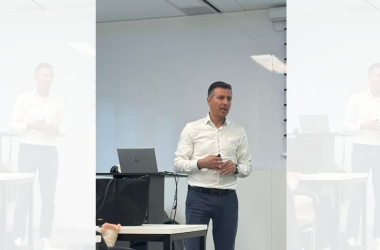Exploring Corporate Sustainability: Insights from ESG Leader Kaveh Hemati

Hemati Discusses Sustainability and ESG in Amsterdam Guest Lecture
In a bid to explore the intricacies of international corporate sustainability, Wittenborg welcomed Kaveh Hemati, an ESG (Environmental, Social and Governance) and sustainability leader from Invesis, as a guest lecturer on 24 April.
The session, which took place at Wittenborg's Amsterdam location, aimed to equip MBA (Master of Business Administration) students with insights into the evolving landscape of sustainable business practices and why big companies need to make ESG a priority.
In his guest lecture, Hemati introduced himself before jumping into Corporate Sustainability in International business environments as well as Sustainability Reporting Regulations and Standards.
Hemati, who is known for his experience in developing and implementing sustainable business strategies across diverse cultural settings, discussed deforestation, waste, climate change and the United Nations' Sustainable Development Goals (SDGs) - which are closely intertwined with some of the initiatives Wittenborg works on throughout the year. He also covered ESG incorporation into business activities, climate mitigation aligned with the Paris Agreement and more.
His main message centred around the growing importance of corporate ESG and sustainability for international businesses, the trends and obligations, and how businesses are responsible for leaving the world a better place for future generations.
He believes that this topic is crucial for businesses. "Investors are looking to make more sustainable businesses, and the public sector requires businesses to be compliant with the more demanding and extending regulation. ESG and sustainability improve the business’s reputation, cause better risk mitigation for companies, and the companies attract talents by being more sustainable."
During the session, Hemati facilitated an engaging exercise titled 'Develop Corporate Sustainability Framework', wherein participants were divided into breakout groups for discussions lasting 10 minutes. This was followed by a Q&A session.
The exercise involved selecting a company, identifying core business activities, and defining sustainability risks and opportunities. Participants proposed Corporate Sustainability Frameworks, exploring avenues for creating added value and mitigating risks within the chosen company. The exercise aimed to foster practical understanding and application of sustainability principles in real-world business scenarios.
Hemati says that students were particularly interested in the UN SDGs and the integration in corporate sustainability, carbon reduction targets and avoiding greenwashing.
Taking all of this into account, he enjoyed the lecture: "It was a pleasure to give this guest lecture, a very interactive session with students, and I understood that the students are very conscious, aware and interested in ESG and sustainability topics."
He says that besides learning about ESG and sustainability principles and practical applications, he would encourage students to also develop knowledge in specific industries and business areas regarding ESG and sustainability integration, and to always keep in mind the bigger picture of how good ESG and sustainability practice could positively affect a business."
WUP 24/06/2024
by Erene Roux
©WUAS Press